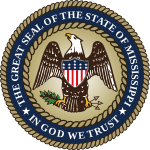
The 1820 United States presidential election was the ninth quadrennial presidential election. It was held from Wednesday, November 1, to Wednesday, December 6, 1820. Taking place at the height of the Era of Good Feelings, the election saw incumbent Democratic-Republican President James Monroe win re-election without a major opponent. It was the third and last United States presidential election in which a presidential candidate ran effectively unopposed. It was also the last election of a president from the revolutionary generation.

David Holmes was an American politician in Virginia and Mississippi. He served five terms as a US congressman from Virginia's 2nd congressional district, and later was important in Mississippi's development as a state. He was appointed by the federal government as the fourth and last governor of the Mississippi Territory. In 1817 he was unanimously elected as the first governor of the state of Mississippi. He served a term as US senator from Mississippi, appointed to fill a vacancy until elected by the legislature. Elected again as governor, he was forced to resign early due to ill health. He returned to Virginia in his last years.

The 15th United States Congress was a meeting of the legislative branch of the United States federal government, consisting of the United States Senate and the United States House of Representatives. It met in the Old Brick Capitol in Washington, D.C. from March 4, 1817, to March 4, 1819, during the first two years of James Monroe's presidency. The apportionment of seats in the House of Representatives was based on the Third Census of the United States in 1810. Both chambers had a Democratic-Republican majority.

The 16th United States Congress was a meeting of the legislative branch of the United States federal government, consisting of the United States Senate and the United States House of Representatives. It met in Washington, D.C. from March 4, 1819, to March 4, 1821, during the third and fourth years of James Monroe's presidency. The apportionment of seats in the House of Representatives was based on the Third Census of the United States in 1810. Both chambers had a Democratic-Republican majority.
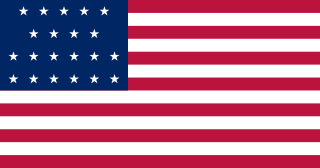
The Territory of Alabama was an organized incorporated territory of the United States. The Alabama Territory was carved from the Mississippi Territory on August 15, 1817 and lasted until December 14, 1819, when it was admitted to the Union as the twenty-second state.

George Poindexter was an American politician, lawyer and judge from Mississippi. Born in Virginia, he moved to the Mississippi Territory in 1802. He served as United States Representative from the newly admitted state, was elected as Governor (1820–1822), and served as a United States Senator.
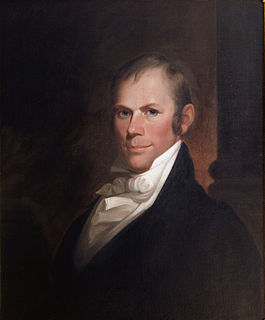
Elections to the United States House of Representatives for the 18th Congress were held at various dates in different states between July 1822 and August 1823 during President James Monroe's second term.

Elections to the United States House of Representatives for the 17th Congress were held at various dates in different states between July 1820 and August 1821 as President James Monroe won reelection unopposed.

Jesse Speight was a North Carolina and Mississippi politician in the nineteenth century.
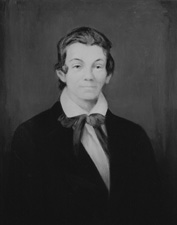
James Fisher Trotter was a United States Senator from Mississippi.

The Treaty of Doak's Stand was signed on October 18, 1820 between the United States and the Choctaw Indian tribe. Based on the terms of the accord, the Choctaw agreed to give up approximately one-half of their remaining Choctaw homeland. In October 1820, Andrew Jackson and Thomas Hinds were sent as commissioners who represented the United States to negotiate a treaty to surrender a large portion of Choctaw country in Mississippi. They met with tribal representatives at Doak's Stand on the Natchez Trace. They met with the chiefs Pushmataha, Mushulatubbee, and Apuckshunubbee, who represented the three major regional divisions of the Choctaw. Chiefs of the towns and other prominent men accompanied them, such as Colonel Silas Dinsmoor.
Orin Fowler was a U.S. Representative from Massachusetts.
Samuel Shepard Conner was a U.S. Representative from Massachusetts.
Andrew Robison Govan was a U.S. Representative from South Carolina.
David C. Dickson was a state legislator, Mississippi Secretary of State, Lieutenant Governor of Mississippi and a U.S. Representative from Mississippi.

Elections are held periodically in the US state of Mississippi.
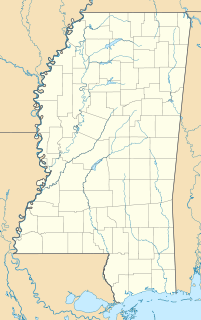
New Mexico is a ghost town located in present-day Issaquena County, Mississippi, United States. New Mexico became extinct prior to the creation of Issaquena County in 1844, so the settlement existed only within Washington County, Mississippi.

Following is a table of United States presidential elections in Maine, ordered by year. Since its admission to statehood in 1820, Maine has participated in every U.S. presidential election. Prior to 1820, much of the territory currently comprising the state of Maine was part of the state of Massachusetts, and citizens residing in that area have thus been able to participate in every U.S. election. Maine awards two electoral votes based on the statewide vote, and one vote for each of the two congressional districts. However, it is rare that this results in a split vote. It has done so twice, in 2016 and 2020.

Following is a table of the United States presidential elections in Mississippi, in chronological order by year. Since its admission to statehood in 1817, Mississippi has participated in every U.S. presidential election except the election of 1864, during the American Civil War, when the state had seceded to join the Confederacy, and the election of 1868, when the state was undergoing Reconstruction.

The 1864 United States presidential election in Nevada took place on November 8, 1864, as part of the 1864 United States presidential election. Nevada voters chose two representatives, or electors, to the Electoral College, who voted for president and vice president.
